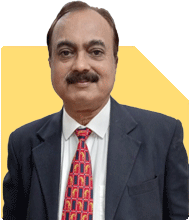Ramalingam Kalirajan |6199 Answers |Ask -Follow
Mutual Funds, Financial Planning Expert - Answered on Jul 19, 2024
He has an MBA in finance from the University of Madras and is a certified financial planner.
He is the director and chief financial planner at Holistic Investment, a Chennai-based firm that offers financial planning and wealth management advice.... more

Hi, I have 35 years old, my in salary is 19LPA in hand. I have a fixed deposit of 2 lakh, 15k sip, 2L invested in stock, 2lakh and 4 lakh emergency fund I have a 2 years old daughter, I don't have any loan. how to plan my retirement
Evaluating Your Financial Goals
Your primary goal is to plan for retirement. This involves determining how much you need to retire comfortably and creating a plan to achieve that goal.
Setting Retirement Goals
Retirement Age: Decide when you want to retire. Let's assume at age 60.
Post-Retirement Expenses: Estimate your monthly expenses during retirement. Factor in inflation.
Emergency Fund
You already have an emergency fund of Rs 4 lakh. This is a good start. Ensure it covers at least 6-12 months of expenses.
Maintain Adequate Coverage: Regularly update your emergency fund as your expenses grow.
Fixed Deposit
Your Rs 2 lakh fixed deposit provides a safety net but offers low returns.
Consider Alternatives: Higher returns options like debt mutual funds for better growth.
SIP (Systematic Investment Plan)
Your Rs 15,000 SIP is a disciplined approach to investing.
Increase SIP: As your income grows, increase your SIP amount. Aim for at least 20-30% of your salary in investments.
Stock Investments
You have Rs 2 lakh invested in stocks.
Diversify Portfolio: Ensure your stock investments are diversified to reduce risk.
Regular Review: Monitor and review your portfolio regularly.
Retirement Corpus Calculation
Estimate the corpus needed for retirement based on your current lifestyle and inflation.
Online Calculators: Use retirement calculators for precise estimates.
Investment Options
Mutual Funds
Mutual funds can provide good returns over the long term. Consider a mix of equity and debt funds.
Equity Funds: For long-term growth.
Debt Funds: For stability and income.
Public Provident Fund (PPF)
PPF is a safe investment with tax benefits. It offers good returns over the long term.
Invest Regularly: Maximize your PPF contributions annually.
National Pension System (NPS)
NPS is a retirement-focused investment option with tax benefits.
Regular Contributions: Invest regularly for long-term growth and retirement corpus.
Child's Education Fund
Start planning for your daughter's education early.
Education SIP: Set up a separate SIP for your daughter's education fund.
Child Plans: Consider child education plans for specific goals.
Insurance
Ensure you have adequate life and health insurance coverage.
Life Insurance: Term insurance to cover financial liabilities.
Health Insurance: Adequate health coverage for the family.
Tax Planning
Optimize your tax savings through various investment options.
Tax-saving Instruments: Utilize PPF, ELSS, and NPS for tax benefits.
Creating a Diversified Portfolio
A well-diversified portfolio reduces risk and enhances returns.
Asset Allocation: Allocate assets across equity, debt, and alternative investments based on risk tolerance.
Suggested Allocation
Equity Funds: 60% for long-term growth.
Debt Funds: 20% for stability.
PPF/NPS: 20% for retirement and tax benefits.
Regular Monitoring and Review
Regularly review and adjust your investment portfolio to ensure it aligns with your goals.
Annual Reviews: Review your portfolio and make adjustments annually.
Consult CFP: Work with a Certified Financial Planner for personalized advice.
Final Insights
Planning for retirement requires a disciplined and diversified approach. Increase your SIP, diversify investments, and utilize tax-saving instruments. Regularly review and adjust your portfolio to stay on track. Leverage the expertise of a Certified Financial Planner for optimal results.
Best Regards,
K. Ramalingam, MBA, CFP,
Chief Financial Planner,
www.holisticinvestment.in
You may like to see similar questions and answers below
Sanjeev Govila |458 Answers |Ask -Follow
Financial Planner - Answered on Nov 25, 2023
Ramalingam Kalirajan |6199 Answers |Ask -Follow
Mutual Funds, Financial Planning Expert - Answered on Jun 11, 2024
Ramalingam Kalirajan |6199 Answers |Ask -Follow
Mutual Funds, Financial Planning Expert - Answered on Jul 03, 2024
Sushil Sukhwani |530 Answers |Ask -Follow
Study Abroad Expert - Answered on Sep 02, 2024
Radheshyam Zanwar |738 Answers |Ask -Follow
MHT-CET, IIT-JEE, NEET-UG Expert - Answered on Sep 02, 2024
Pradeep Pramanik |146 Answers |Ask -Follow
Career And Placement Consultant - Answered on Sep 02, 2024
Pradeep Pramanik |146 Answers |Ask -Follow
Career And Placement Consultant - Answered on Sep 02, 2024
Radheshyam Zanwar |738 Answers |Ask -Follow
MHT-CET, IIT-JEE, NEET-UG Expert - Answered on Sep 02, 2024
Sushil Sukhwani |530 Answers |Ask -Follow
Study Abroad Expert - Answered on Sep 02, 2024
Pradeep Pramanik |146 Answers |Ask -Follow
Career And Placement Consultant - Answered on Sep 02, 2024
Radheshyam Zanwar |738 Answers |Ask -Follow
MHT-CET, IIT-JEE, NEET-UG Expert - Answered on Sep 02, 2024
Ramalingam Kalirajan |6199 Answers |Ask -Follow
Mutual Funds, Financial Planning Expert - Answered on Sep 02, 2024
Ramalingam Kalirajan |6199 Answers |Ask -Follow
Mutual Funds, Financial Planning Expert - Answered on Sep 02, 2024






















